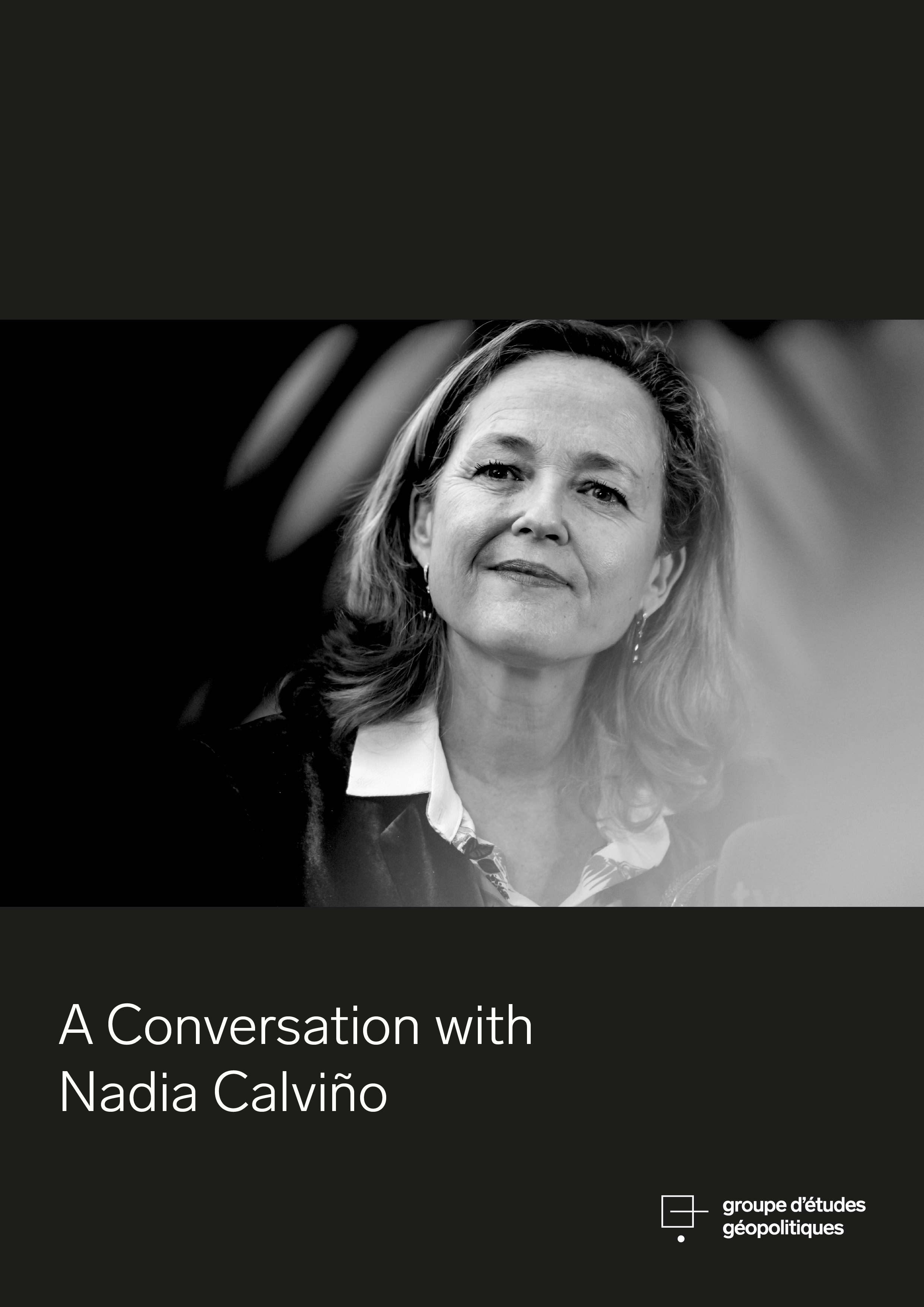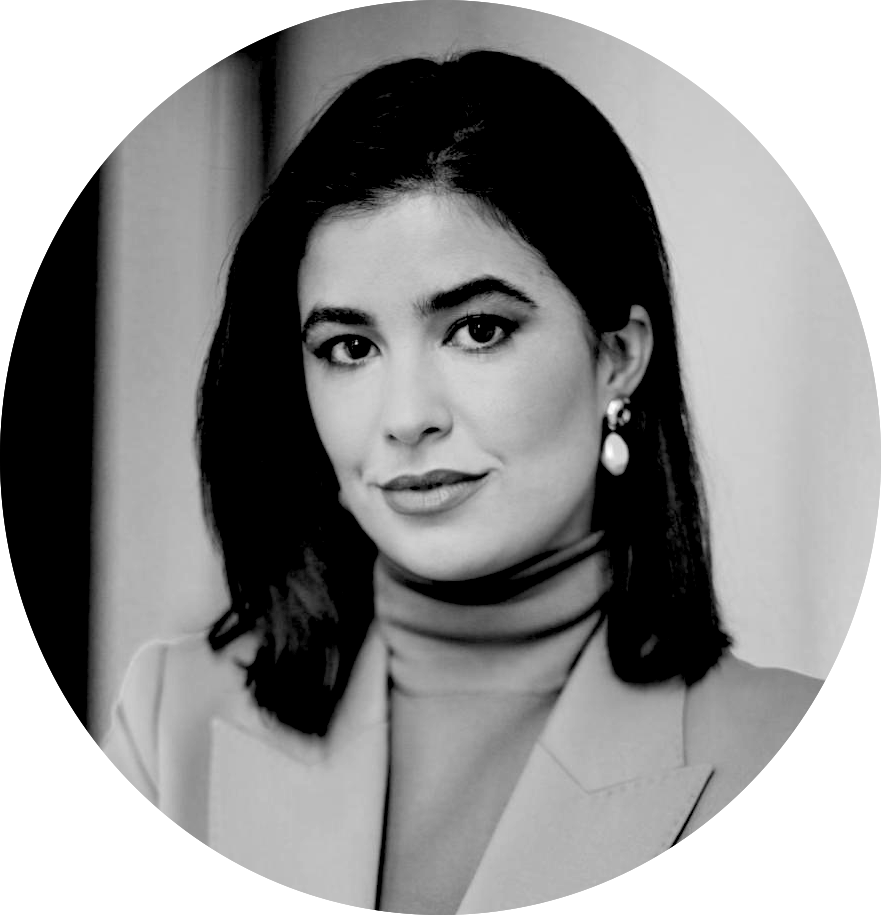A Conversation With Nadia Calviño
Maria Tadeo
Grand Continent EU Correspondant06/02/2025

06/02/2025

 Voir tous les articles
Voir tous les articles
A Conversation With Nadia Calviño
President Trump is pitching a Golden Era for America while the zeitgeist in Europe is one of decline and loss of competitiveness. What is your assessment?
The global order that has governed the world for the past 80 years, based on cooperation, common rules and multilateralism, has been beneficial for Europe, but even more so for the United States: the dollar has been the global currency since Breton Woods — that alone gives the US economy an advantage. The same goes for the World Trade Organisation and the international financial framework. The United States has been a central actor in building the institutions because it was beneficial for them too.
In Europe, we have to stick to our values and our principles because we have an interest in maintaining and preserving trade based on rules and international cooperation. For Europe, it is about articulating win-win solutions.
That is the approach taken by Europe, and we should maintain it while building on our strengths — we are a trading and economic powerhouse. When we say we want both sides to prosper we mean it. That makes our model unique in today’s world. Our single market is one of a kind.
President Trump believes the world is ripping off the United States, and tariffs are a tool to change that. He has indicated that he will impose tariffs on the European Union as a result. Should we confront – or bow?
We have to move away from seeing international relations as a zero-sum game. I do not subscribe to the idea that in order for us to win, someone has to lose and vice versa. Our interest is to look for outcomes that contribute to a more prosperous, sustainable and safe world. There is no doubt that the US is our strategic partner and that the transatlantic relation is important. We — both the EU and the US — have every interest in working together and maintaining a positive relationship.
But we cannot be naive.
As Europeans, we need to strengthen our strategic autonomy. We cannot continue to be strategically dependent on other parts of the world when it comes to energy, chips and technology, security and defence. That makes us vulnerable.
When it comes to the United States, does that mean acting forcefully?
We have clear strengths. We should not feel powerless.
We are a superpower when it comes to trade and our single market. Our universities and research centers are second to none. We have world-class industries. We need to stand firm and continue to be a beacon of prosperity not only in economic terms, but also in terms of values. Our unity is our strength.
From my experience, many of our partners around the world are calling on us, as the European Union, to stand firm in defending the rules-based multilateral order because they see it as the best way to preserve global stability and economic prosperity.
These are not just words, but facts. We have recently signed the Mercosur agreement, which includes a major economy like Brazil. We have strengthened our economic ties with Mexico, we are resuming talks with Malaysia, and we want to do the same with India.
We are sending a clear message to the world that the EU is open for business — we are ready to engage constructively and in the interest of mutually beneficial partnerships. Our partners are responding to that call.
Ursula von der Leyen echoed the same message: if there is a deal to be made, the EU will engage whenever there is mutual interest. Is this the beginning of a more transactional EU?
My impression, having spoken to both President von der Leyen and President Antonio Costa, is that they will make this a priority.
Our partners value the fact that dealing with the EU means shared prosperity and security. A strong EU also means stronger partners.
The European Commission recently unveiled its Competitiveness Compass to make the Union more efficient and cut red tape. Globally, President Trump could trigger a race to the bottom on deregulation. Can the EU remain competitive?
Our aim is to cut red tape and reduce the regulatory burden on institutions, businesses and citizens. That is clear — and we must do it if we are to achieve and accelerate our strategic goals.
Does that mean, for example, rolling back the targets of the Green Deal?
We need to double down on the green transition because it is the key driver for a more productive and competitive industry. It is also central to our security and strategic autonomy. We have to invest in clean energy and energy infrastructure. That is what we are doing at the European Investment Bank.
However, to achieve our goals and encourage green investment – which is necessary – we need to recalibrate some rules and reporting requirements so that they are fit for purpose.
To give you just one example, current reporting requirements do not capture a large proportion of green investments, such as lending to the public sector, to SMEs and outside the EU. If we look at the business model of the EIB and national development banks, this regulation does not incentivise green financing. That is why we have sent a joint letter to the Commission calling for a recalibration of these requirements so that they are fit for purpose and truly incentivise green financing.
Yet the tide seems to be turning against the green agenda politically. Is it fair to say that the Green Deal was well-intentioned but poorly designed?
We should look ahead. It’s about now and how we move forward.
We need market integration, we need to mobilise investment and we need rules that are fit for purpose. Let us be pragmatic. The Green Deal has entered a new phase. It started with a vision and targets, now it is driven by new technologies and business interest. The majority of European companies believe that the green transition is a great opportunity. Our figures show that more than 60% of European companies are investing and have invested in the green transition. That means they see an opportunity. Our job is to support them in this process and that is what we are doing at the EIB, calling for more market integration and recalibrating some of these rules.
Beyond public debates and politics, what I see is that companies are getting on with the green transition, moving to a new industrial model that is more sustainable and efficient. To be competitive, we need the cheapest and cleanest energy – and in many cases, cleanest is also the cheapest. Everyone agrees that we need to reduce our dependence on fossil fuels. Russia is a perfect example of an energy dependency that ultimately proved harmful to Europe. That is why we need to diversify our energy sources, continue to develop renewables, integrate our energy market and push for more interconnections and grids. The aim is to make SMEs more energy efficient and to decarbonise heavy industry. This is the path we are on, we should stay on it.
Last week, 19 Member States called on the EIB to play a greater role in defence and security and suggested that the list of excluded operations should be revised to reflect this. How would you respond? Ursula von der Leyen said after an informal meeting of EU leaders that she trusts the EIB will play a bigger part. How?
I welcome the strong support of Europe’s leaders for our proactive approach in this area.
During 2024, we stepped up our support for Europe’s security and defence industry, doubling annual investment to €1 billion. We significantly extended eligible investments in dual-use projects and technologies, to include border protection, military mobility, critical infrastructures, de-mining and de-contamination, space, cybersecurity, anti-jamming technologies, military equipment and facilities, drones, seabed infrastructure protection and research.
We are conducting a constant market test to calibrate well our financial instruments and assess whether further changes to our eligibility rules are needed. We are engaging closely with EU governments, and key stakeholders in identifying flagship projects. And we plan to again double investment in Security and Defence in 2025, bringing it to a 2 billion euros record high. I can also share with you that we are already looking closely at a pipeline of 14 concrete projects expected for approval in the coming months. We will continue to step up our support, while safeguarding the financing capacity of the EIB Group, in line with the unanimous mandate of the European Council.
The US is aiming to invest 500 billion dollars with the private sector to fund the next stage of the AI revolution, and China appears to be making progress. Last October, the EIB presented European finance ministers with a set of measures to scale up innovation and make it easier go public.What has been the response so far?
At the EIB, we are taking a bold approach, increasing higher risk activities to support innovation and are currently working with the Commission to scale up key technologies from cleantech to health tech, chips, artificial intelligence, quantum and high-performance computing. It is not just about investment: it is also crucial to promote market integration — so that ideas, technologies and companies born in the EU can grow in Europe.
In Europe, we should do more to integrate capital markets across the Union, as this will facilitate large-scale investment. Integration and investment should go hand in hand. If we make progress on this, European champions will have all the tools they need to stay in Europe and grow in Europe. This will boost our competitiveness and productivity. Most importantly, it will give us a strong position in the world today and in the future.
Now is the time to act.
citer l'article
Maria Tadeo, A Conversation With Nadia Calviño, Feb 2025,





